复习Unit2
- 格式:doc
- 大小:40.00 KB
- 文档页数:3

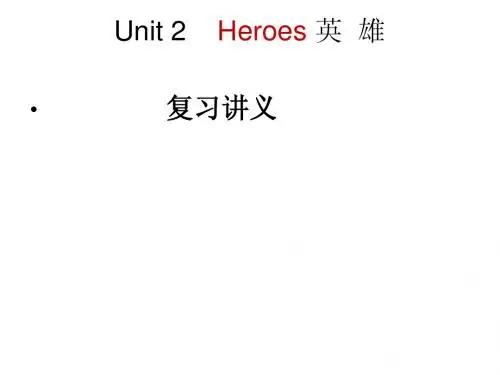
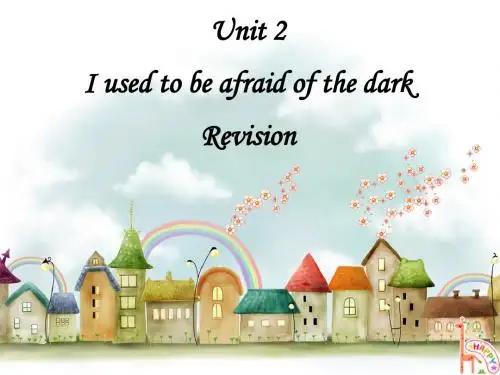
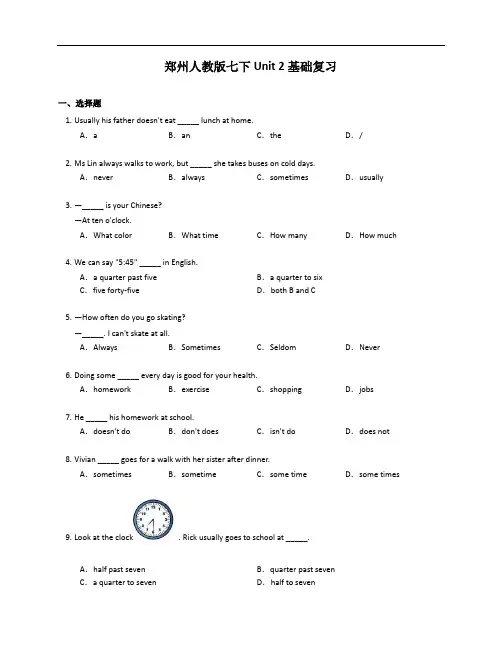
郑州人教版七下Unit 2基础复习一、选择题ually his father doesn't eat _____ lunch at home.A.a B.an C.the D./2.Ms Lin always walks to work, but _____ she takes buses on cold days.A.never B.always C.sometimes D.usually3.—_____ is your Chinese?—At ten o'clock.A.What color B.What time C.How many D.How much4.We can say "5:45" _____ in English.A.a quarter past five B.a quarter to sixC.five forty-five D.both B and C5.—How often do you go skating?—_____. I can't skate at all.A.Always B.Sometimes C.Seldom D.Never6.Doing some _____ every day is good for your health.A.homework B.exercise C.shopping D.jobs7.He _____ his homework at school.A.doesn't do B.don't does C.isn't do D.does not8.Vivian _____ goes for a walk with her sister after dinner.A.sometimes B.sometime C.some time D.some times9.Look at the clock. Rick usually goes to school at _____.A.half past seven B.quarter past sevenC.a quarter to seven D.half to seven10.— _____ do you play soccer?— After school.A.When B.Where C.What D.Which11.Jenny's dinner time is _____ 7:30.A.for B.at C.on D.in12.—_____ do you have PE?—On Monday and Friday.A.Why B.What time C.When D.Where13.—_____?—At eight thirty.A.What time is it now B.What's the timeC.What time do classes begin D.Is it the time14.I have only two tickets of Kung Fu Panda. _____ you _____ he can go with me.A.Either; or B.Neither; nor C.Both; and D.Between; and15.—What time is it?—_____ Let's go to school.A.It's Sunday.B.It's 9 October.C.It's seven a.m.D.It's five p.m.二、填空题(共25题)16.You're late for school. You must come to school e next time.17.It's too hot. You need to take a s after doing sports.18.—I want to buy six bottles of milk. How much are they?—Three for ¥ 20.00. Six for f yuan.19.Mary and Jane are teachers and they w in the same school.20.—What's the time, please?—It's nine o .21.We often see stars in the sky at n .22.I sometimes play basketball for h an hour.23.My room is very dirty. Please help me c it.24.My mother often takes a w after dinner.25.The coat is ninety yuan. I have forty yuan. Can you borrow me f yuan?26.In our (组), Zhao Feng usually goes to school at seven o'clock.27.I like my school (生活) very much.28.Her (工作) is to help the poor children go back to school.29.Can you wait for me at the gate of the radio (电台)?30.My grandfather likes sports very much. He (跑) for an hour every day.31.I don't think this story is (滑稽好笑的).32.It's a (一刻钟) past nine.33.Mike usually goes to bed at twenty (过) nine.34.Mary (刷) her teeth at 7:00 in the morning.35.Michael up (起床) at six every day.36.She (usual) goes to school at 7:30.37.Tony runs very (quick). I can't follow him.38.The hamburger (taste) very good.39.Too much candy is bad for your (tooth).40.I have many good friends, but Lucy is my (good) friend.三、翻译题(共5题)41.比尔七点十分穿好衣服。
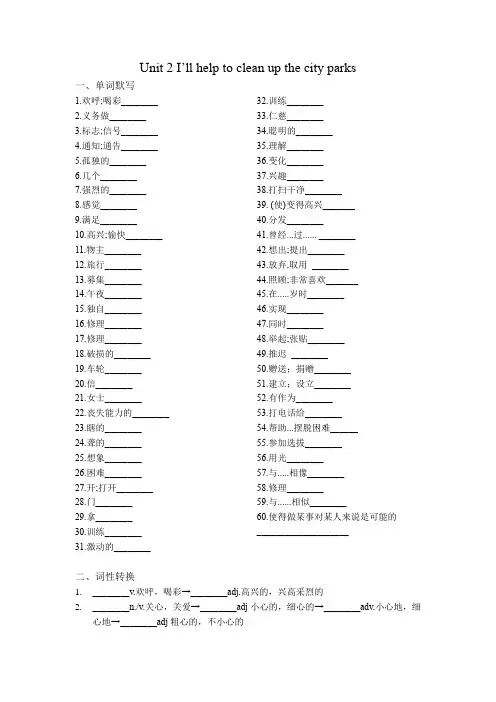
Unit 2 I’ll help to clean up the city parks 一、单词默写1.欢呼;喝彩________2.义务做________3.标志;信号________4.通知;通告________5.孤独的________6.几个________7.强烈的________8.感觉________9.满足________10.高兴;愉快________11.物主________12.旅行________13.募集________14.午夜________15.独自________16.修理________17.修理________18.破损的________19.车轮________20.信________21.女士________22.丧失能力的________23.瞎的________24.聋的________25.想象________26.困难________27.开;打开________28.门________29.拿________30.训练________31.激动的________ 32.训练________33.仁慈________34.聪明的________35.理解________36.变化________37.兴趣________38.打扫干净________39. (使)变得高兴_______40.分发________41.曾经...过...... ________42.想出;提出________43.放弃,取用________44.照顾;非常喜欢_______45.在.....岁时________46.实现________47.同时________48.举起;张贴________49.推迟________50.赠送;捐赠________51.建立;设立________52.有作为________53.打电话给________54.帮助...摆脱困难______55.参加选拔________56.用光________57.与.....相像________58.修理________59.与......相似________60.使得做某事对某人来说是可能的____________________二、词性转换1.________v.欢呼,喝彩→________adj.高兴的,兴高采烈的2.________n./v.关心,关爱→________adj小心的,细心的→________adv.小心地,细心地→________adj粗心的,不小心的3.________adj.强烈的,强壮的→________adv.强烈地4.________n.感觉,感触→________v.感受,感触5.________n.高兴,愉快→________adj.愉快的,愉悦的6.________n.主人,物主→________v.拥有→own. adj.自己的7.________v.打破,折断→________adj.破损的,残缺的8.________adj可以的,能够的→________n能力→________v使能够→________adj残疾的9.________n.困难,难题→________adj.困难的10.________v理解,懂得→________adj善解人意的,体谅人的11.________n.兴趣/v.使….感兴趣,使关注→________adj.有趣的→________adj.感到有趣的12.________n.友善的→________n.善良13.fix 过去式__________三、课文默写你可以去看望医院里生病的孩子让他们高兴。
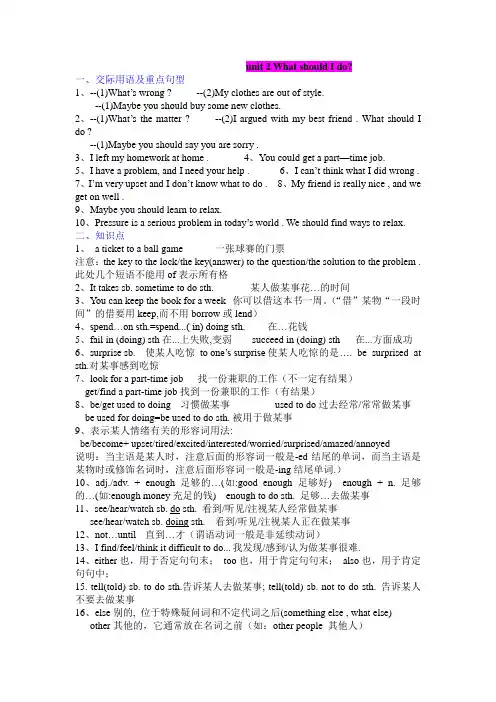
unit 2 What should I do?一、交际用语及重点句型1、--(1)What’s wrong ? --(2)My clothes are out of style.--(1)Maybe you should buy some new clothes.2、--(1)What’s the matter ? --(2)I argued with my best friend . What should I do ?--(1)Maybe you should say you are sorry .3、I left my homework at home .4、Y ou could get a part—time job.5、I have a problem, and I need your help .6、I can’t think what I did wrong .7、I’m very upset and I don’t know what to do . 8、My friend is really nice , and we get on well .9、Maybe you should learn to relax.10、Pressure is a serious problem in today’s world . We should find ways to relax.二、知识点1、a ticket to a ball game 一张球赛的门票注意:the key to the lock/the key(answer) to the question/the solution to the problem .此处几个短语不能用of表示所有格2、It takes sb. sometime to do sth. 某人做某事花…的时间3、Y ou can keep the book for a week 你可以借这本书一周。
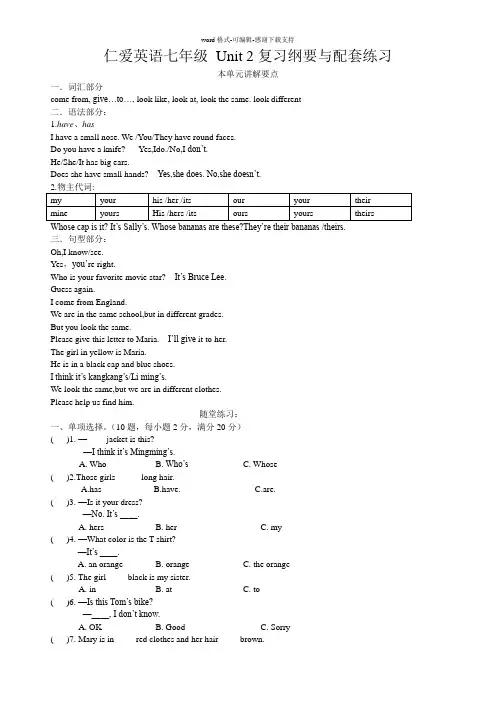
仁爱英语七年级Unit 2复习纲要与配套练习本单元讲解要点一.词汇部分come from, give…to…, look like, look at, look the same. look different二.语法部分:1.have、hasI have a small nose. We /You/They have round faces.Do you have a knife? Yes,Ido./No,I don’t.He/She/It has big ears.Does she have small hands? Yes,she does. No,she doesn’t.Whose cap is it? It’s Sally’s. Whose bananas are these?They’re their bananas /theirs.三.句型部分:Oh,I know/see.Yes,you’re right.Who is your favorite movie star? It’s Bruce Lee.Guess again.I come from England.We are in the same school,but in different grades.But you look the same.Please give this letter to Maria. I’ll give it to her.The girl in yellow is Maria.He is in a black cap and blue shoes.I think it’s kangkang’s/Li ming’s.We look the same,but we are in different clothes.Please help us find him.随堂练习:一、单项选择。
(10题,每小题2分,满分20分)( )1. —____ jacket is this?—I think it’s Mingming’s.A. WhoB. Who’sC. Whose( )2.Those girls _____ long hair.A.hasB.have.C.are.( )3. —Is it your dress?—No. It’s ____.A. hersB. herC. my( )4. —What color is the T-shirt?—It’s ____.A. an orangeB. orangeC. the orange( )5. The girl ____ black is my sister.A. inB. atC. to( )6. —Is this Tom’s bike?—____, I don’t know.A. OKB. GoodC. Sorry( )7. Mary is in ____ red clothes and her hair ____ brown.A. /; isB. a; areC. /; are( )8. —Do you look like your sister?—No, we ____.A. look the sameB. look differentC. look like( )9. —You are nice in this dress.—____A. It’s right.B. No, it isn’t.C. Thank you.( )10.-What does your brother look like?-She has _____nose.A.a big red B .a red big C.red big二、词汇运用。
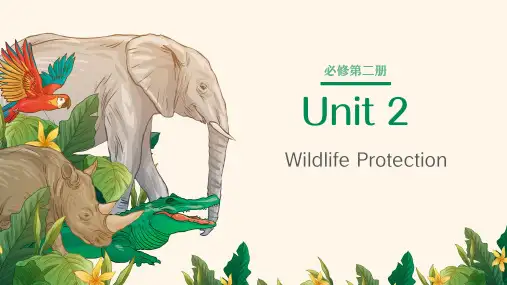
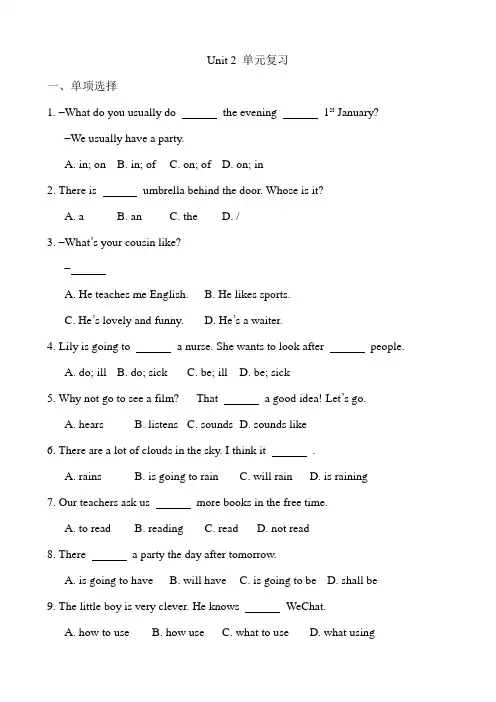
Unit 2 单元复习一、单项选择1. –What do you usually do the evening 1st January?–We usually have a party.A. in; onB. in; ofC. on; ofD. on; in2. There is umbrella behind the door. Whose is it?A. aB. anC. theD. /3. –What’s your cousin like?–A. He teaches me English.B. He likes sports.C. He’s lovely and funny.D. He’s a waiter.4. Lily is going to a nurse. She wants to look after people.A. do; illB. do; sickC. be; illD. be; sick5. Why not go to see a film? That a good idea! Let’s go.A. hearsB. listensC. soundsD. sounds like6. There are a lot of clouds in the sky. I think it .A. rainsB. is going to rainC. will rainD. is raining7. Our teachers ask us more books in the free time.A. to readB. readingC. readD. not read8. There a party the day after tomorrow.A. is going to haveB. will haveC. is going to beD. shall be9. The little boy is very clever. He knows WeChat.A. how to useB. how useC. what to useD. what using10. What does the notice , Mary?A. talkB. sayC. speakD. tell11. Can you cook eggs with tomatoes? Yes of course. do it.A. AnyoneB. SomeoneC. AnythingD. Something12. What’s wrong? My bike isn’t .A. workB. goC. workingD. using13. –Dear, go to bed before 9 o’clock.–OK. I , Mum.A. doB. don’tC. willD. won’t14. Peter often makes his sister . What a nice brother!A. feels happyB. feel happyC. feels sadD. feel sad15. Little Wilson is good at drawing. He may become a good some day.A. workerB. artistC. cookD. player二、完形填空My dearest Aunt Chen lives in the country (郊区). But she isn’t a 1 . She 2 vegetables from the farmers and sells (卖) them in town. Sometimes she can’t sell out all her vegetables, 3 she gives some to us. Aunt Chen is old and short, but she’s very 4 . She can walk 5 .Aunt Chen has no 6 . She lives with her only black dog. Every summer, I go to stay with 7 for a week or two. She is very happy and often takes me to a farm nearby. Life in the country is 8 . I can go fishing, and I can hear birds sing and sheep bleat. I can also go to play in the field with 9 children and work with the farmers. The farmers don't do farm work with animals now. They use machines todo it. 10 of them live a modern life.1. A. teacher B. doctor C. farmer D. nurse2. A. grows (种植) B. sells C. asks D. buys3. A. but B. so C. or D. because4. A. healthy B. ill C. happy D. interesting5. A. slowly B. fast C. near D. far6. A. money B. friends C. home D. children7. A. him B. her C. it D. your8. A. unhappy B. boring C. poor D. interesting9. A. another B. any other C. other D. others10. A. Both B. All C. Each D. None三、阅读理解AWelcome to our community centre!We have different clubs. It is a great place to keep fit and enjoy yourselves!1. You can see the information .A. in a comic bookB. on TVC. in a magazineD. on the community notice board2. The word “cool” means “ ” in the sentence “It is really cool!”A. wonderfulB. not hot or warmC. coldD. difficult3. You can take the dancing class at .A. 7:00 a.m.B. 3:00 p.m.C. 4:00 p.m.D. 8:00 a.m.4. Mr. Thomas is free from 6:00 a.m. to 8:00 a.m. and he can go to .A. Ball Games ClubB. Swimming ClubC. Free ClassesD. Kids Club5. Mrs. Thomas wants her 5-year-old girl to learn dancing. She should call .A. 375-4789B. 375-4753C. 375-4676D. 375-4766BDo you live with your grandparents or great-grandparents? Recently, a video called “Four Generations”has become popular online. It shows the structure of a Chinese family from young children to great-grandparents. It also shows how much Chinese people love their family.In many Chinese families, a few generations live together. This is called anextended family. Usually it is “four-two-one”—four grandparents, two grandparents and one child.This family structure has both good and bad sides. When parents are busy with work, grandparents can help take care of the children. According to The Atlantic magazine, 90% of children in Shanghai and 70% of children in Beijing grow up with the care of grandparents.But some people say grandparents love their grandchildren too much and let them eat too much. Arguments may happen among family members of different ages.Life can be both sweet and bitter. Family life is no different. But the most important thing to remember is that family is all about love.6. What is the structure of a Chinese family in the video?A. From young children to parents.B. From young children to grandparents.C. From parents to great grandparents.D. From young children to great grandparents.7. What does the video show?A. How busy Chinese people are.B. How sad Chinese people are.C. How much Chinese people love their children.D. How much Chinese people love their family.8. Who spends the most time staying with children according to The Atlantic?A. Parents.B. Grandparents.C. Great-grandparents.D. Nurses.9. Which of the following is NOT true according to the passage?A. A video called “Four Generations” has become popular online.B. “Four-two-one”—four grandparents, two grandparents and one child.C. This family structure doesn't have any bad sides.D. Life can not always be sweet.10. Which would be the best title for the passage?A. Four Generations.B. Parents and grandparents.C. Different families.D. Love from grandparents.四、填空A)根据括号中所给汉语写出单词,使句子意思完整正确。
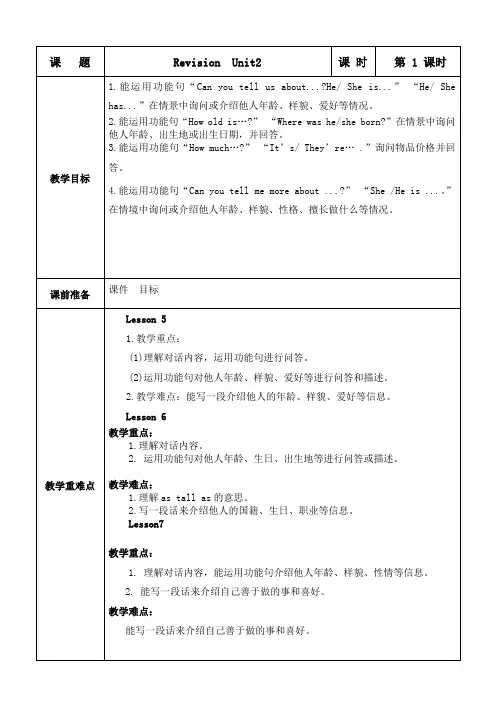
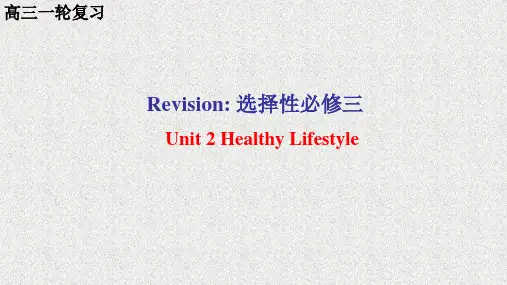
Unit 2 Fit for life话题词汇1.creative adj.富有创造力的2.determination n.决心3.humorous adj.幽默的4.independent adj.独立的5.profession n.职业6.qualification n.资格;学历7.be honored as被誉为……8.be active in积极从事于9.be admitted into a key university考上重点大学10.think highly/well of对……高度评价经典语篇请根据下面人物简介写一篇短文:姓名屠呦呦国籍中国职业药学家、科学家主要经历1.1930年12月30日生于浙江宁波;2.1951年考入北京大学,专攻/主修制药专业,于1955年毕业;3.毕业后接受中医培训两年半,并一直在中国中医研究院工作;4.1972年成功发现并制成一种治疗疟疾的药物——青蒿素而获得多种奖项;5.2015年10月5日,她被授予诺贝尔生理学或医学奖,成为中国第一个获得诺贝尔奖的女性科学家。
总结我们要向她学习,投身科学研究。
注意:词数150左右。
参考词汇:中国中医研究院/所China Academy of Traditional Chinese Medicine;疟疾malaria佳作欣赏Tu Youyou,a famous female pharmacologist and scientist,was born in Ningbo,Zhejiang Province on December 30th,1930.① In 1951,she was admitted into Beijing University,majoring in making medicine and graduated in 1955.After graduation she was trained in traditional Chinese medicine for two years and a half② and she hasbeen working in China Academy of Traditional Chinese Medicine in Beijing.In 1972,she succeeded in discovering and developing artemisinin out of a Chinese herb to cure those patients of malaria in different places of the world,so that she won many big awards.③To our excitement and delight,she was awarded the Nobel Prize in Physiology or Medicine on October 5th,2015,becoming the first Chinese woman who won the Nobel Prize④ .We are called on to learn from her and devote ourselves to scientific research.思维发散1.将第①句改为含有定语从句的复合句Tu Youyou,who is a famous female pharmacologist and scientist,was born in Ningbo,Zhejiang Province on December 30th,1930.2.将第②句改为含有时间状语从句的复合句After she graduated,she was trained in traditional Chinese medicine for two years and a half.3.将第③句中的so that从句改为“介词+关系代词”引导的定语从句In 1972,she succeeded in discovering and developing artemisinin out of a Chinese herb to cure those patients of malaria in different places of the world,for which she won many big awards.4.将第④句中的定语从句改为短语作定语becoming the first Chinese woman to win the Nobel PrizeⅠ.重点单词A.写作单词1.vital (adj.)对……极重要的,必不可少的2.potential (n.)可能性,潜在性;潜力,潜能;(adj.)潜在的;可能的3.unable (adj.)不能,无法4.beneficial (adj.)有益的,有用的benefit (n.)利益,好处;(v.)有助于,受益5.possess (vt.)拥有,具有possession (n.)[C,常用复数]所有物;财产;[U]具有,拥有6.astonish (vt).使十分惊讶,使吃惊astonishing (adj.)令人十分惊讶的astonished (adj.)感到十分惊讶的astonishment (n.)惊讶,惊异7.application (n.)应用,运用;申请,申请表;涂抹,外敷apply (vi.)申请;适用;(vt.)应用;涂,敷applicant (n.)申请人8.approval (n.)批准,通过;赞成,同意approve (vt.)批准,同意;(vi.)赞成9.effective (adj.)有效的;实际的,事实上的;生效的effect (n.)效果,作用;影响10.reasonable (adj.)合理的,有理由的;公道的;明智的unreasonable (adj.)不合理的reason (n.)理由;(v.)推理11.arrangement (n.)排列,布置;安排;约定,协议arrange (v.)安排,筹划;整理,排列,布置12.applaud (vi.& vt.)鼓掌;称赞,赞许applause (n.)鼓掌,喝彩13.sharp (adj.)锋利的;急剧的;灵敏的;尖锐的,严厉的sharpen (vt.& vi.)(使)变锋利;提高,改善14.addicted (adj.)上瘾;入迷addict (n.)吸毒成瘾的人,对……入迷的人;(vt.)使上瘾,使沉迷addiction (n.)瘾,嗜好addictive (adj.)使上瘾的,使人入迷的15.phenomenon (n.)现象phenomena (pl.)16.accelerate (vt.& vi.)(使)加速,加快acceleration (n.)加速,加快B.阅读单词17.outcome (n.)结果,后果plex (adj.)复杂的,难懂的;(n.)建筑群;相关联的一组事物;情结19.theory (n.)理论,学说20.relate (vt.& vi.)联系,把……联系起来;叙述,讲述21.bestselling (adj.)畅销的22.surgeon (n.)外科医师23.dull (adj.)钝的,不锋利的;迟钝的;枯燥的;灰暗的,昏暗的24.revolution (n.)巨变,大变革;革命25.counter (n.)柜台;计数器;反驳;(vt.)反驳;抵制,抵消26.chew (vt.& vi.)咀嚼,嚼碎;咬,啃27.tablet (n.)药片;丸;牌,匾,碑28.symptom (n.)症状;征兆29.sickness (n.)疾病;恶心,呕吐sick (adj.)生病的;恶心的,呕吐的30.bleed (vt.)流血,失血blood (n.)血31.chemist (n.)药剂师,药商;化学家chemical (n.)化学物质;化学制品;(adj.)化学的chemistry (n.)化学32.circulate (vi.& vt.)循环;传播,散布;传递,传阅circulation (n.)循环,流通33.abnormal (adj.)不正常的,反常的normal (n.& adj.)正常(的),一般(的)34.subscribe (vi.)定期订购或订阅subscriber (n.)订阅者;订购者;捐助者subscription (n.)订阅,订购;捐助;签字,签署Ⅱ.重点短语1.try out测试,试验;参加选拔2.wear somebody out使筋疲力尽;使厌烦3.let out放出,发出4.subscribe to同意,赞成5.mass production批量生产6.be cautious about对……小心谨慎7.manage to do sth.设法做成某件事8.in...form/in the form of...以……形式9.be addicted to对……上瘾,痴迷10.swell up肿胀,膨胀Ⅲ.经典句式1.Have you ever seen a doctor?If so,what happened?你曾经看过医生吗?如果看过的话,发生了什么事?2.If you open any medicine cupboard or go to any medicine counter in the world,it is likely that you will find aspirin and penicillin.倘若你打开世界上任何一个药柜,或者走到任何一个卖药的柜台,都有可能找到阿司匹林和青霉素。
[学案]初四年级(上)Unit 2复习导学案课题:It must belong to Carla.复习任务一:应掌握的词汇野餐n. 噪音 n. ___________ ___________n.猴子___________ n. 风___________n. 石头___________n.v.气味 ___________n. 手指___________n. 邻居 ___________ n. 海洋unhappy adj. ___________ ___________adj. 最后的可能地 adv. ___________aux.v. 必须,一定要 ___________v.面试 v. 落下,掉下___________v. 赶上(车船等);捕获 ___________v. 追赶复习任务二:应掌握的词组•1. 奇怪的事情strange things/something strange •2. _跑着赶车run to catch a bus•3. 为锻炼而跑步run for exercise • 4. be used to doing sth. 习惯于做某事be used to do sth.=be used for doing sth.被用来做某事used to do 过去常常干某事•5.组成make up 6. be made up of……由……组成•7. 不但……而且……not only……but also•8. 直到……才 not……until •9.拿相机的一个女人a woman with a camera•10. 小心……be careful of……•11. 担心……be worried about=worry about•12、吵闹 make a noise •13、around the world= all over the world 世界各地全世界1.属于__________________2.形成;组成;构成_______________________3.发带 ___________________4.用完;用光 ________________________5.听古典音乐__________________6.期末考试__________________________7.因为(加名词)__________________ 8.看见一个人在跑步___________________ 9.过去常常做某事__________________ 10.在附近_____________________________被用来做某事_____________________(2)11.玩得高兴__________________________12.从…逃跑_________________________ 13.当心…____________________________14.担心…____________________________(2) 15. 假装做某事______________________复习任务三 应掌握的句子一.情态动词表推测判断1. 情态动词+ bedoWhose notebook is this ?这是谁的笔记本?It must/could/can’t be mine (名物) /Ning’s(名词所有格).它一定/可能/一定不是我/宁的。
1 一、阅读理解 A well-dressed lady entered the office. She looked at Debbie and Simon, and then walked over to Debbie. Debbie gave her a cheerful greeting. Simon sighed and walked away. Mr Yang came over at once and said, “You made a good impression on her, Simon.” “That was my sister,” said Simon. “She wanted to remind me that tomorrow is her birthday.” “What’s the matter?” Mr Yang asked. “People always choose Debbie instead of me. I don’t understand.” “I do. It’s the way you communicate.” “How can that be?” Simon asked. “I don’t get a chance to speak.” “Communicating is more than just speaking. Your body language is important too.” “Body language?” “It’s the way you stand and sit. It’s your gestures and the expression on your face. Your whole appearance communicates things. You don’t give people a good impression, Simon. You look down, you never smile and you don’t turn your head towards them. “Look at Debbie. She’s holding her head up. She always smiles and looks friendly. Her body language is making people feel welcome, so they go to her for help.” Simon decided to improve his body language. He sat up straight and tried smiling at people. Minutes later, a beautiful girl entered. She walked over to Simon. A few moments later, she left with a smile. Mr Yang came over at once and said, “You made a good impression on her, Simon.” “That was my sister,” said Simon. “She wanted to remind me that tomorrow is her birthday.” ( )1. Simon was worried because ______. A. he had only part-time job B. he was poorer than Debbie C. few customers chose him D. he couldn’t communicate with others ( )2. In Mr Yang’s pinion, which is more important, speaking or body language? A. Speaking. B. Body language. C. Both. D. Neither. ( )3. Which of the following is NOT TRUE about Simon? A. He always looked down. B. He never smiled. C. He should improve his body language. D. He was angry with Debbie. ( )4. Mr Yang thought the beautiful girl came over to Simon because ______. A. Simon’s body language worked B. she knew Simon C. Simon sat up straight D. she made a good impression on Simon ( )5. What can you infer(推断) according to the passage? A. Simon may go to his sister’s birthday. B. No customers will choose Simon. C. Simon will go home at once. D. MrYang will laugh at Simon. 二、综合阅读 Eye contact Eye contact means looking into another person’s eyes. This is a very important part of body language. It can be the(A)______ to communication. Eye contact can show 2
feelings(B)such as friendliness, interest and understanding. In Western countries, (C)using eye contact in conversation is very important. If you do not use eye contact, Westerners may think that you are not listening. And if you look away, they may also think that (D)你在说谎. However, in many Asian countries, looking down when talking with an older person, like a teacher or a parent, is polite. These differences can cause (E)______. For example, an Asian person might look down while listening to a Western speaker. The Western speaker might think this person is not interested in what (F)he or she is saying. Not using eye contact can cause problems, but using too much is (G)not polite either. In many countries, watching other people, especially strangers, for a long time is impolite. This may make them feel nervous. 1.在(A)和(E)的空白处分别填入适当的单词:_____________ _____________ 2.分别写出划线部分(B)和(G)处的同义词或近义词语:_____________ ______________ 3.将划线句子(C)改写为: ________ very important ________ ________ eye contact in conversation. 4.将划线部分(D)译成英语:_________________________________ 5. 文中划线部分(F)指代的是:_________________________ 6.找出能说明本文中心大意的主题短语:_________________ 三、阅读回答问题 Ballet is a special form of art. It’s a French word. It means “to dance”. There’s no talking or singing in ballet. The dancers use body language such as steps, gestures and the expressions on their faces to tell stories. Ballet began in Western Europe in the 15th century. Today it was become popular all over the world. One of the most famous ballets in the world is Swan Lake. The dancers tell the story and express feelings through their body language. For example, some of the dancers must give people the impression that they’re swans. They do this by moving their arms like swings and moving their necks like the long necks of swans. It’s not easy to become a ballet dancer. Training usually starts at an early, and the dancers have to practice very hard every day. They learn to use their bodies to communicate all kinds of messages with beauty. 1. What does ballet mean? _________________________________________________ 2. Is there any talking or singing in ballet? _________________________________________________ 3. What kind of body language do the dancers use to tell stories? _________________________________________________ 4. When and where did Ballet begin? _________________________________________________ 5. How do the dancers tell the story and express feelings? _________________________________________________ 6. How do the dancers give people the impression that they’re swans? _________________________________________________ 7. It’s not easy to become a ballet dancer, is it?